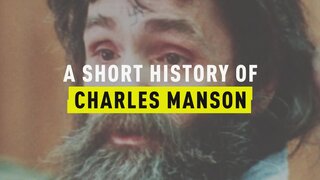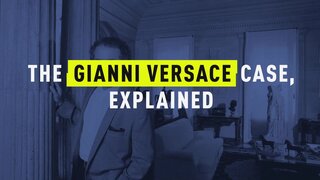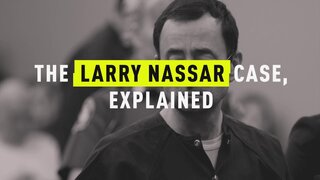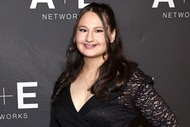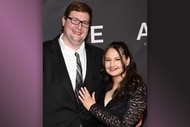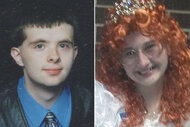Create a free profile to get unlimited access to exclusive videos, breaking news, sweepstakes, and more!
'Chose To Go To That Dark Place:' Calum Worthy Set Crime Scene Photos As Phone Background To Prep For ‘Act’ Role
Calum Worthy said he feels for Nicholas Godejohn, whose likeness was the basis for Worthy's character in Hulu's "The Act."
Actor Calum Worthy went to great lengths and dark depths for his role as Nicholas Godejohn in “The Act.” In fact, his intense preparation for a role as an infamous murderer included isolating himself, watching disturbing videos right before bed, and looking at crime scene photos as part of his wake-up routine.
“The Act,” a Hulu show, is a fictional anthology series, with each season focusing on a different true crime. The show is based on the real murder of Clauddine “Dee Dee” Blanchard, whom Godejohn stabbed to death. He did it because he was dating her daughter, Gypsy Rose, and he wanted to save her — Dee Dee was forcing Gypsy to appear to be a sickly, mentally disabled child, enduring unnecessary surgeries and consuming unneeded medicine in a suspected case of Munchausen by proxy.
Psychologist Kent Franks testified at a 2016 hearing that the real Godejohn has more the mind of a child than an adult, according to a 2016 report by KY3 in Springfield, Missouri. He said that after two mental evaluations on Godejohn, he determined the killer is on the autism spectrum with an IQ of 82 and the functionality equivalent to that of a 10-year-old.
After getting the role in “The Act,” Worthy wanted to make sure he was doing his character justice, which makes sense given the complexities of both Godejohn and the case. So Worthy broke down his research for it into extensive two parts, he told Oxygen.com in an interview.
The first part was all about academic research, as the actor put it. First, Worthy spoke to Michelle Dean, author of the BuzzFeed News story which served as the basis for "The Act."
Then, Worthy said, because Godejohn is considered to be on the autism spectrum, he spent a lot of a time at a center for autism, where he asked a specialist “a million questions.”
As a result of the academic research, he wrote a six-to-seven page essay about Godejohn, which broke down all the elements of the real Godejohn that Worthy did know.
“Once I had all the things I knew for sure about him, I could start to develop parts of him that we didn’t know,” he said, explaining how the birth of the show’s character began.
“It was a long breakdown of who Nick is, how he walks, what he eats, how he thinks,” Worthy said. “How he would think or feel in certain situations, his fears, and trying to understand the real mechanics of autism itself.”
Then came the emotional research: “Trying to dig into his soul and to figure out how to walk in his shoes.”
To do that, Worthy said he “really shut the world out” during the entire time that “The Act” was being shot. He took down his social media, and stopped talking to friends as much.
“I felt very isolated on purpose by design,” he explained. “I also chose to go to that dark place at night because I knew that at night that character would be in those dark places. So, before I fell asleep, I would watch disturbing videos online and I would try to be in that headspace before I fell asleep.”
While Worthy wouldn’t reveal the specific gruesome details of those videos, he said “there were a lot” he watched on YouTube which featured violence and other “pretty messed-up stuff.”
“I’m a pretty light, positive person most of the time so it was counterintuitive to go to that place,” he explained.
Worthy even took it a step further, though it was against his intrinsic nature.
“I also knew that he [Godejohn] was haunted by some of the images from the crime itself afterwards so I found images from the documentary [“Mommy Dead and Dearest,” a documentary about the Gypsy Rose and Dee Dee’s murder] and I put them as the background of my phone so it’d be the last thing I’d see when I went to bed and the first thing when I woke up.”
Talk about a way to end and begin the day.
As a result of diving so deep, Worthy said he now sees more of the gray areas of life and understands the depths of others as opposed to simple labels like “murderers.”
After all that emotional research, Worthy now calls Godejohn a “real complex individual who went through a lot of struggles and made a terrible decision and it’s just really tragic.”
In the show, the character based on Godejohn comes off as less calculating murderer and more someone who struggles with social cues and at times is almost endearingly awkward, like when he pushes off disposing the murder weapon to eat chicken wings or when he makes it clear he thinks he and Gypsy are a real life Bonnie and Clyde.
Even though Worthy admits the crime Godejohn committed was horrific, he said he now feels empathy for him.
“After the research I realized that there was so much more to this person and there were so many reasons why he got there that were out of his control, even though he decided to do it and he obviously deserves to face consequences for committing a murder,” he said. “It took away the labels of good and bad and made me just ask why did this happen and why did that person go to that place... and it made me feel sorry for the victims that people hurt and also sorry for the people who commit the crimes themselves because they are struggling with a lot of issues of their own.”
In both real life and the show, Godejohn paid the consequences for what he did. While Gypsy took a plea bargain and was sentenced to 10 years in prison for her role in her mother’s murder, he was sentenced to life behind bars without the possibility of parole.
Is that sentence too harsh, we asked Worthy?
“I’m not too sure,” he responded. “I still struggle with that as I’m sure a lot of us do while watching the show.”
Worthy said he does think of the real-life Godejohn often.
“I still really feel for him, and what keeps me up at night is thinking about him in his cell and making sure that he’s OK and safe.”
Worthy has also starred as Alex Trimboli in the true crime mockumentary “American Vandal,” and although that show was not based on any real crime, rather a comical fictional one, the actor said the process was very similar.
“We didn’t approach any of those moments with comedy,” he said of the filming, adding that the comedic elements all came in post-production. “We approached it as serious characters dealing with a serious crime.”

